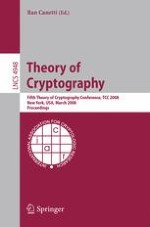2008 | OriginalPaper | Buchkapitel
Degradation and Amplification of Computational Hardness
verfasst von : Shai Halevi, Tal Rabin
Erschienen in: Theory of Cryptography
Verlag: Springer Berlin Heidelberg
Aktivieren Sie unsere intelligente Suche, um passende Fachinhalte oder Patente zu finden.
Wählen Sie Textabschnitte aus um mit Künstlicher Intelligenz passenden Patente zu finden. powered by
Markieren Sie Textabschnitte, um KI-gestützt weitere passende Inhalte zu finden. powered by
What happens when you use a partially defective bit- commitment protocol to commit to the same bit many times? For example, suppose that the protocol allows the receiver to guess the committed bit with advantage
, and that you used that protocol to commit to the same bit more than
times. Or suppose that you encrypted some message many times (to many people), only to discover later that the encryption scheme that you were using is partially defective, and an eavesdropper has some noticeable advantage in guessing the encrypted message from the ciphertext. Can we at least show that even after many such encryptions, the eavesdropper could not have learned the message with certainty?
In this work we take another look at amplification and degradation of computational hardness. We describe a rather generic setting where one can argue about amplification or degradation of computational hardness via sequential repetition of interactive protocols, and prove that in all the cases that we consider, it behaves as one would expect from the corresponding information theoretic bounds. In particular, for the example above we can prove that after committing to the same bit for
n
times, the receiver’s advantage in guessing the encrypted bit is negligibly close to
.
Our results for hardness amplification follow just by observing that some of the known proofs for Yao’s lemmas can be easily extended also to handle interactive protocols. On the other hand, the question of hardness degradation was never considered before as far as we know, and we prove these results from scratch.
